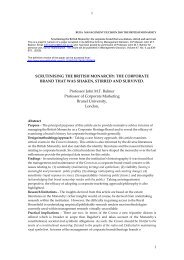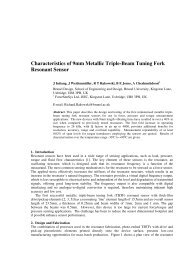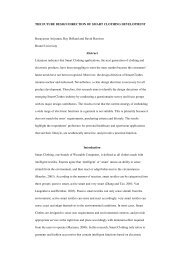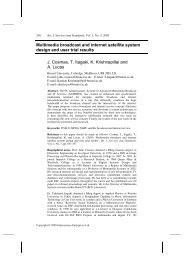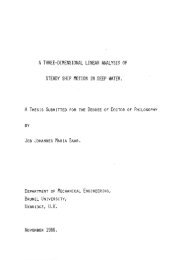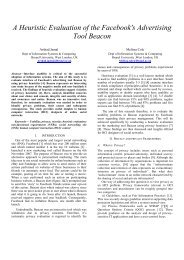- Page 1 and 2: Brand Management Strategy for Korea
- Page 3 and 4: ABSTRACT This research recommends a
- Page 5 and 6: 2.3.3.1 The link between team ident
- Page 7 and 8: 5.2.6 Red Devils and Be the Reds (C
- Page 9 and 10: Figure 28. Summary of Results (Hypo
- Page 11 and 12: CHAPTER 1. INTRODUCTION These days,
- Page 13 and 14: 1983. Unlikely sports teams in Euro
- Page 15 and 16: Year Games Total Average 1983 40 83
- Page 17 and 18: From the perspective of CRM (Custom
- Page 19 and 20: esult testified among Korean footba
- Page 21 and 22: 1.1.2 Objectives Refining the exist
- Page 23 and 24: Chapter 1 (Introduction) This chapt
- Page 25 and 26: Chapter 7 (Discussion) This chapter
- Page 27 and 28: customer in such a way as to commun
- Page 29 and 30: strengths of the product the brand
- Page 31 and 32: and identity is an integral part of
- Page 33 and 34: all associations that are retrieved
- Page 35 and 36: excitement of watching their favour
- Page 37: 2.3. Identification 2.3.1. Fan-Team
- Page 41 and 42: Wann (2006) A method to measure a f
- Page 43 and 44: customers use brand affiliation as
- Page 45 and 46: high influence on consumerism, and
- Page 47 and 48: (Gwinner and Eaton, 1999; Gwinner,
- Page 49 and 50: A number of researchers have agreed
- Page 51 and 52: 2005). Bhattacharya and Sen (2003)
- Page 53 and 54: attends matches (Backman and Crompt
- Page 55 and 56: 2.4.1. The link between F-T identif
- Page 57 and 58: The definitions of brand loyalty fo
- Page 59 and 60: elationships between team identity,
- Page 61 and 62: organisation; attitudinal benefits
- Page 63 and 64: CHAPTER 3. METHODOLOGY The purpose
- Page 65 and 66: The purpose of the first step is to
- Page 67 and 68: analysed using the factor analysis
- Page 69 and 70: of a partial event in a population,
- Page 71 and 72: allows individual readers to make t
- Page 73 and 74: differences between males and femal
- Page 75 and 76: teams, (2) how much they know about
- Page 77 and 78: igorous testing one might expect (D
- Page 79 and 80: 1956). In addition, in order to exa
- Page 81 and 82: and identity in team sports by cons
- Page 83 and 84: procedure and expectations, a detai
- Page 85 and 86: Figure 2. Screen Plot Although the
- Page 87 and 88: team identity scale. The resulting
- Page 89 and 90:
dimensions: experience, visual, non
- Page 91 and 92:
its meaningful background and histo
- Page 93 and 94:
This identity, however, works in a
- Page 95 and 96:
several ways in which a website can
- Page 97 and 98:
As fans come to believe that their
- Page 99 and 100:
5.1.5 Logo A logo, being an image a
- Page 101 and 102:
5.1.6 Colour Teams have traditional
- Page 103 and 104:
The UTSA (The Uniform and Textile S
- Page 105 and 106:
In the case of the football teams,
- Page 107 and 108:
The teams that have become synonymo
- Page 109 and 110:
5.1.10 Owner Team owners can provid
- Page 111 and 112:
to have similar qualities (Mullin e
- Page 113 and 114:
Several research studies done on te
- Page 115 and 116:
The star players can play a crucial
- Page 117 and 118:
Barcelona's Nou Camp, Newcastle's S
- Page 119 and 120:
5.2.2 FC Barcelona with Unicef (Spo
- Page 121 and 122:
Catalonia to a worldwide scale duri
- Page 123 and 124:
MyFC has shown a progressive model
- Page 125 and 126:
prepares and produces cheering inst
- Page 127 and 128:
Football teams‟ logos usually bor
- Page 129 and 130:
organisation. In fact, a lot of Kor
- Page 131 and 132:
5.2.7 FC Arsenal (Uniform) Arsenal
- Page 133 and 134:
123
- Page 135 and 136:
5.2.8 A.F.C. Wimbledon (Regional pr
- Page 137 and 138:
It has been broadly known that relo
- Page 139 and 140:
2008). The teams possess large base
- Page 141 and 142:
Source: Jasonplant (2008) Figure 18
- Page 143 and 144:
The case of FC United offers an imp
- Page 145 and 146:
This nickname, in fact, even more e
- Page 147 and 148:
Olympique Lyon play their home game
- Page 149 and 150:
global sporting icon, especially in
- Page 151 and 152:
much of the £24.5 million that Rea
- Page 153 and 154:
identity similarity and distinctive
- Page 155 and 156:
CHAPTER 6. EMPIRICAL STUDY 2 The pu
- Page 157 and 158:
Experience Identity Visual Identity
- Page 159 and 160:
identification, attitudinal loyalty
- Page 161 and 162:
Attitudinal loyalty The attitudinal
- Page 163 and 164:
6.2 Assessing the Measurement Model
- Page 165 and 166:
Items My favourite team has a disti
- Page 167 and 168:
Construct Items Cronbach’s alpha
- Page 169 and 170:
159 Product Identity Visual Identit
- Page 171 and 172:
Identity Attractiveness(η4): λ14
- Page 173 and 174:
The Lisrel output furnishes some me
- Page 175 and 176:
H1b: Visual identity has a positive
- Page 177 and 178:
H2c: Non-product identity has a pos
- Page 179 and 180:
This relationship has a parameter e
- Page 181 and 182:
H5: Identity distinctiveness has a
- Page 183 and 184:
H9: Attitudinal loyalty has a posit
- Page 185 and 186:
In the first step, consumers‟ psy
- Page 187 and 188:
To implement an efficient identific
- Page 189 and 190:
The key contribution of the finding
- Page 191 and 192:
7.3 Implications This research has
- Page 193 and 194:
7.3.2 Practical Implications 1) Thi
- Page 195 and 196:
7.4 Limitations and Directions for
- Page 197 and 198:
Ambler, T., Bhattacharya, C.B., Ede
- Page 199 and 200:
Available at: http://www.bbc.co.uk/
- Page 201 and 202:
Bolton News, 2005. FC United in Lei
- Page 203 and 204:
Colchester, M., 2008. One Team Gets
- Page 205 and 206:
International Sports Journal, 7(1),
- Page 207 and 208:
Funk, D. C. & James, J. D., 2006. C
- Page 209 and 210:
Hirt, E.R. & Zillmann, D., 1992. Co
- Page 211 and 212:
Johnson. T., 1984. The myth of decl
- Page 213 and 214:
Lederer, C. & Hill, S., 2001. See y
- Page 215 and 216:
Medsker, G.J., Williams, L. J. & Ho
- Page 217 and 218:
Parker, K. & Stuart, T., 1997. The
- Page 219 and 220:
Schmidt, K., 1995. The Quest for Id
- Page 221 and 222:
Swann, W.B., Jr. 1987. Identity neg
- Page 223 and 224:
Wakefield, K.L., 1995. The pervasiv
- Page 225 and 226:
Available at: http://www.entreprene
- Page 227 and 228:
APPENDIX 1 Survey for Football Team
- Page 229 and 230:
1. What is the football team you su
- Page 231 and 232:
☺ Thanks for your cooperation ☺
- Page 233 and 234:
email address here ________________
- Page 235 and 236:
Part 3: The questions in this part
- Page 237 and 238:
APPENDIX 3 Survey for Football Team
- Page 239 and 240:
1. What is the football team you su
- Page 241 and 242:
Part 4: The questions in this part




